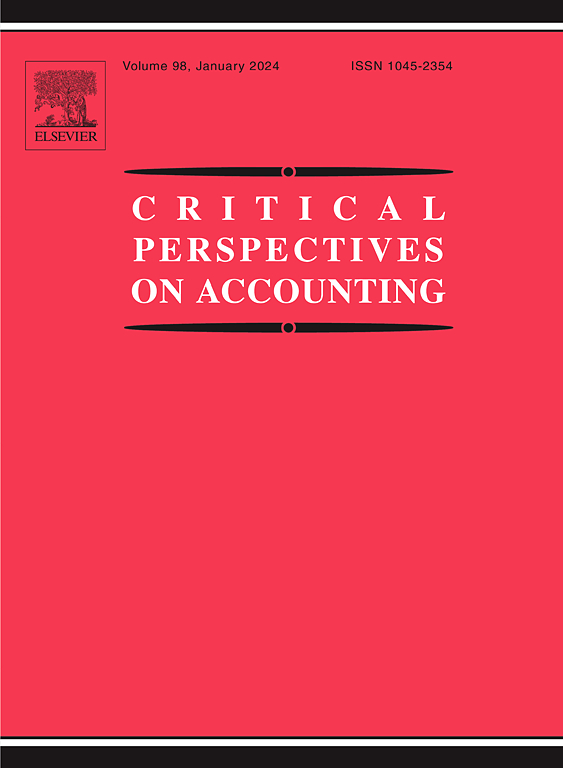新社会的会计和生命政治:厄立特里亚、埃塞俄比亚、利比亚和索马里的意大利殖民主义(1922-1941)
IF 5.7
2区 管理学
Q1 BUSINESS, FINANCE
引用次数: 0
摘要
意大利法西斯主义者对非洲的干预不仅是出于经济动机,而且是为了重新设计土著居民和定居者,以创建一个由法西斯意识形态塑造的新社会。1922年至1941年期间,厄立特里亚、埃塞俄比亚、利比亚和索马里等殖民地的预算、人口普查和报告等会计工具是收集信息的重要手段,这些信息将为控制土著居民和意大利定居者行为方式的政策提供信息。最终,这是为了改变他们的动机和行动,创造条件,为殖民大国带来重大的政治和经济利益。通过阿伦特和福柯关于生命政治和极权主义的研究,本研究调查了殖民地法西斯会计的方式,而不仅仅是一种促进有效征用当地资源的手段,被用来培养新一代强大、无情的意大利人,并发展一个高度种族化的社会。会计的生物政治属性可以以看不见的方式干预个人的生活,从而改变个人的生活方式和优先事项,甚至促进歧视和种族主义,从而实现控制。本文章由计算机程序翻译,如有差异,请以英文原文为准。
Accounting and biopolitics for a new society: Italian colonialism in Eritrea, Ethiopia, Libya and Somalia (1922–1941)
Intervention in Africa by the Italian Fascists was not justified only by economic motives but sought to re-engineer the Indigenous population and settlers in the creation of a new society shaped by Fascist ideology. Accounting tools in the form of budgets, censuses and reports from the colonies of Eritrea, Ethiopia, Libya and Somalia between 1922 and 1941 were essential means to gather information which would inform policies that would control the way in which both the Indigenous population and Italian settlers conducted themselves. Ultimately this was meant to change their motives and actions to create the conditions that would lead to significant political and economic gains for the colonising power. Informed by the work of Arendt and Foucault on biopolitics and totalitarianism, this study investigates the way in which Fascist accounting in the colonies, rather than being solely a means to promote the efficient expropriation of local resources, was to be used to build a new generation of strong, ruthless Italians and develop a highly racialised society. In unseen ways the biopolitical properties of accounting can allow interventions in the lives of individuals which can modify an individual’s lifestyle and priorities and even promote discrimination and racism that enable control.
求助全文
通过发布文献求助,成功后即可免费获取论文全文。
去求助
来源期刊

Critical Perspectives on Accounting
BUSINESS, FINANCE-
CiteScore
9.40
自引率
7.80%
发文量
91
期刊介绍:
Critical Perspectives on Accounting aims to provide a forum for the growing number of accounting researchers and practitioners who realize that conventional theory and practice is ill-suited to the challenges of the modern environment, and that accounting practices and corporate behavior are inextricably connected with many allocative, distributive, social, and ecological problems of our era. From such concerns, a new literature is emerging that seeks to reformulate corporate, social, and political activity, and the theoretical and practical means by which we apprehend and affect that activity. Research Areas Include: • Studies involving the political economy of accounting, critical accounting, radical accounting, and accounting''s implication in the exercise of power • Financial accounting''s role in the processes of international capital formation, including its impact on stock market stability and international banking activities • Management accounting''s role in organizing the labor process • The relationship between accounting and the state in various social formations • Studies of accounting''s historical role, as a means of "remembering" the subject''s social and conflictual character • The role of accounting in establishing "real" democracy at work and other domains of life • Accounting''s adjudicative function in international exchanges, such as that of the Third World debt • Antagonisms between the social and private character of accounting, such as conflicts of interest in the audit process • The identification of new constituencies for radical and critical accounting information • Accounting''s involvement in gender and class conflicts in the workplace • The interplay between accounting, social conflict, industrialization, bureaucracy, and technocracy • Reappraisals of the role of accounting as a science and technology • Critical reviews of "useful" scientific knowledge about organizations
 求助内容:
求助内容: 应助结果提醒方式:
应助结果提醒方式:


